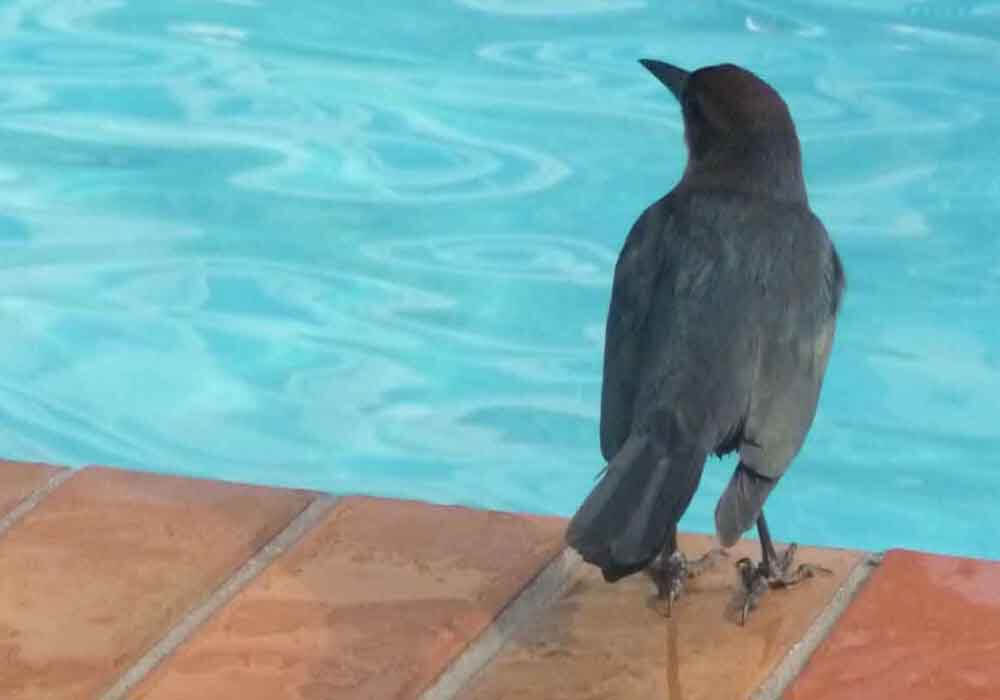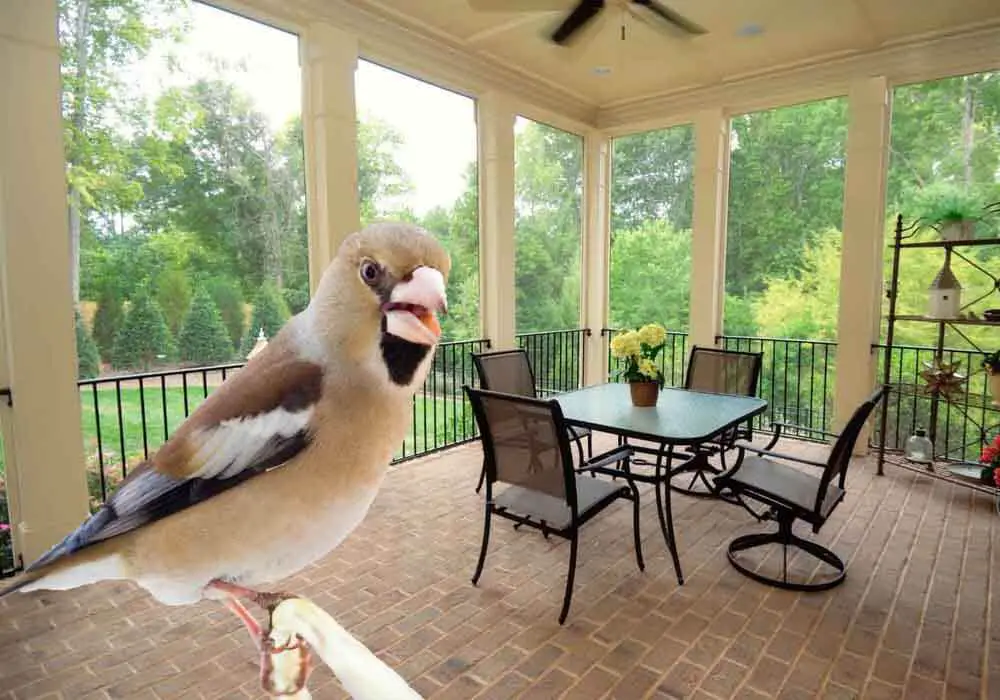How To Keep Birds Away
From My Garden
Tending to our gardens takes much effort and time. It can be heartbreaking if they get ransacked by creatures like birds. So, it’s understandable that you’re wondering, “how to keep birds away from my garden?”
Installing nets is the best way to keep birds away from your garden. The nets prevent birds from harming the plants while letting small, helpful insects in. They are also the most efficient bird deterrent measure for the long term.
Birds are known to cause damage and eat vegetables from gardens. It’s alright if you want to keep them away. So, if you’re wondering “how to keep birds away from my garden,” we’ll help you do just that in this article.

1. Secure Your Garden With Nets
Garden nets are the most efficient way to keep birds away, especially if you are looking for a long-term solution. This is especially relevant if your area is populated by birds.
However, going for garden nets can require effort to install them. It can also be an investment, especially if you have a big garden and want the best quality materials. But as I’ve said, they’re the best option for the long term, so they’re worth it.
If your local hardware or garden store does not sell garden nets, you can find them on Amazon.com. I recommend these...
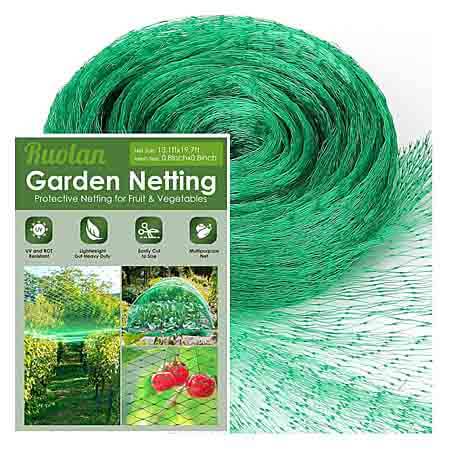
Ruolan Bird Netting for Garden.
This net is made from propylene and is resistant to rot and UV. It’s also lightweight and easy to cut but durable and multi-purpose. These features make it perfect for gardens exposed to various elements.
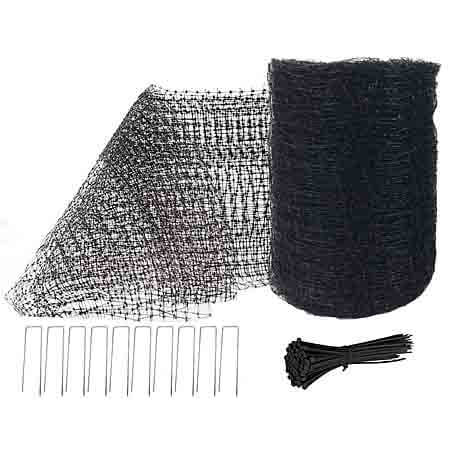
Feitore Deer Fence Netting.
This Feitore netting is not just effective against deer but also against birds and other creatures. This is also made from propylene, is resistant to rust or rot, and does not tangle easily.
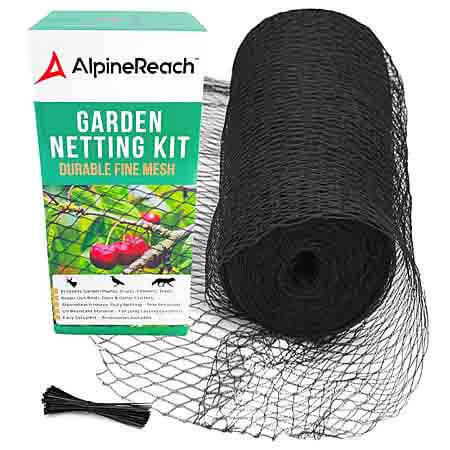
AlpineReach Garden Netting.
This heavy-duty net is made from composite, UV-resistant materials. Flexible but durable, you can set it up to closely protect your plants and crops. It is also sold with accessories like zip ties for easier installation.
Substitute Garden Nets With Garden Fleece
If you can’t find garden nets but have garden fleece on hand (or can easily find one), you can also use that instead. Garden fleece is a net that protects against harsh elements, especially during cold or winter seasons.
Garden fleece is usually made from polypropylene. It appears transparent and lightweight and comes in different thicknesses. The material works by raising temperatures while avoiding overheating.
There are both pros and cons to using fleece. For instance, it may be effective as a barrier and protection against cold temperatures. However, elevated temperatures may also lead to the proliferation of pests, diseases, weeds, and other organisms that can encroach on the fleece.
2. Install Bird Deterrents
If you find nets too much of a hassle, you can resort to simpler, efficient bird deterrents. As the name implies, they may not actually prevent birds from coming near, but their appearances and other features do discourage the creatures from doing so.
These deterrents keep birds away from your garden in two ways:
- Appearance. The sight of shiny or scary-looking objects, like scarecrows and CDs, is often enough to keep birds away from your garden.
- Noise. Noise-producing items that emit scary noises for birds are effective in keeping birds away from your garden.
Reflective Deterrents
Most birds veer away from reflective or shiny objects. Thus, you can use them as bird deterrents for your garden.
Here are some reflective deterrents you can use:
- Shiny balloons
- Shiny ribbons (you can attach this to plain balloons, too)
- Old CDs
- Half-filled plastic bottles
- Shiny tape
- Aluminum foil
Audible Deterrents
Audible deterrents are those that produce noise. You can use speakers and play scary, pre-recorded sounds, such as the screech of predatory birds like owls, hawks, or eagles.
While you can play sounds over speakers, that may not be so efficient in the long run. Instead, you can opt for a less intrusive but still effective audible bird deterrent, such as wind chimes.
Not only do wind chimes create pleasant, tinkling sounds, but most of them also come with shiny metal tubes. Thus, they can serve as both reflective AND audible deterrents.
Bird Repellent Sprays
You can spray birds with a homemade concoction or bird repellent. The pungent smell of peppers and cinnamon oil drives birds away from your garden.
To create a homemade bird repellent, mix cinnamon or peppermint essential oil with cayenne peppers and water. Transfer into a spray bottle and use.
Pets
Pets, such as cats or dogs, are also effective at keeping birds away from your place. They also make great, loyal companions.
But, you must commit to taking care of them and being responsible for their wellbeing. Make sure they have a home, food, water, toys, and lots of love and appreciation.
Moreover, you have to accept that pets won’t be effective guards immediately. Some may need training and will be playful at the start, digging through your garden and plants.
Other Deterrents
In this section, I'll look at some other practical and popular deterrents that are not reflective, audible, alive, or in spray form. These include:
- Scarecrows. To improve the effectiveness of scarecrows, you can stick CDs or reflective materials to its body. You might also have to move it every now and then so the birds won’t catch on to it.
- Decoys. Fake toys or decoys of common bird predators, like snakes or owls, are also effective. Like scarecrows, you may have to transfer them often to be effective.
- Wind spinners. Items that move around in the wind are also intimidating to birds. If you can find reflective wind or garden spinners, they could be more effective.
- Balloons with eyes. You can draw big, scary eyes on plain or non-reflective balloons to serve as bird deterrents. You can also try terror eye balloons, like this Bird-X Scare-Eye® Bird Repellent Predator Eyes Balloon (available on Amazon.com), which has big ominous eyes to scare birds away. For added measure, tie a reflective or shiny ribbon to it.
- Flags. Like wind spinners, flags move or flap in the wind.
- Garden balls. Birds find large, colorful garden balls scary and won’t approach them. Place them around your garden. You can choose pretty-looking ones to liven up your place.
3. Protect Individual Plants Using Physical Barriers
If you have fragile plants or individual seedlings you especially want to protect from birds, there are several available measures you can take.
One of the answers to the question of “how to keep birds away from my garden” is that you can install physical barriers around your plants, such as:
- Inverted crates
- Disposable cups
- Chicken wire
- Sticks
Create a Stick Jungle
You can use many sticks to protect your whole garden. Just stick as many as possible into the soil to appear like a dense jungle.
This “stick jungle or forest” discourages birds from going near, although it can be a hassle for harvesting and other garden work.
4. Remove Items That Attract Birds
Birds come to your garden for a reason. They are likely attracted to food sources, like nuts, feed, bird feeders, or water sources, like baths and waterers.
They may also like your place for its abundance of branches and roosting sites. Prune your trees and plants to discourage them from coming near and eliminate potential roosting areas.
You should also remove or transfer bird feeders and water baths. Moving the baths and feeders is a good way to reduce the risk of birds coming to your garden without expending too much effort.
How To Keep Birds Away From My Garden...
Conclusion
As you can see there are multiple ways to keep birds away from your garden it's just a matter of finding which solution works the best as one might work while the other might not.
Consider too the thought of rotating these deterrent ideas as once the birds get used to one solution it might not be as effective as it used to be.
Back To The TOP Of This How To Keep Birds Away From My
Garden Page

About the Author...
Richard Worden, a dedicated bird lover for over 20 years, I love to share my in-depth knowledge and passion for birds. Read more About Me and my expertise in this field.
- We Know Birds HOME ›
- How To Scare Away Birds From Your House Or Garden ›
- How To Keep Birds Away From My Garden
